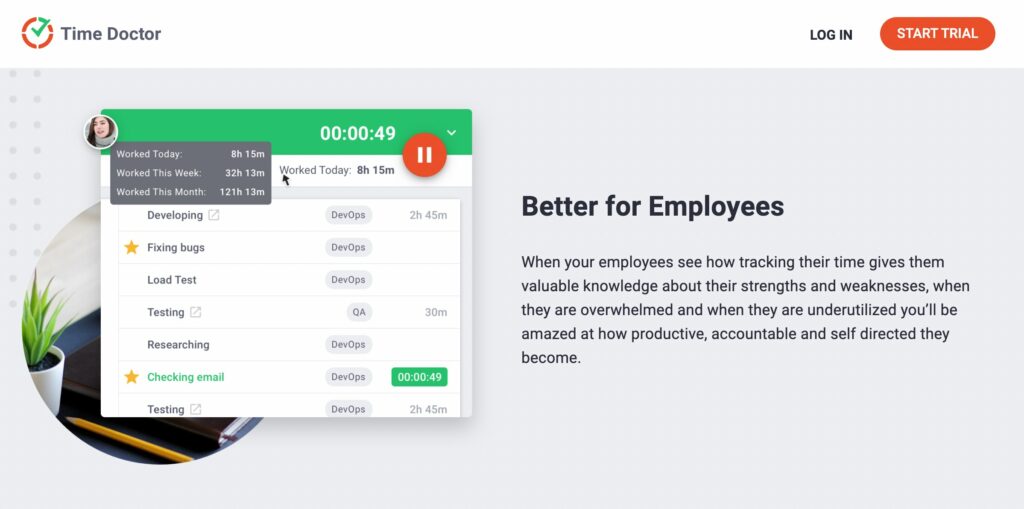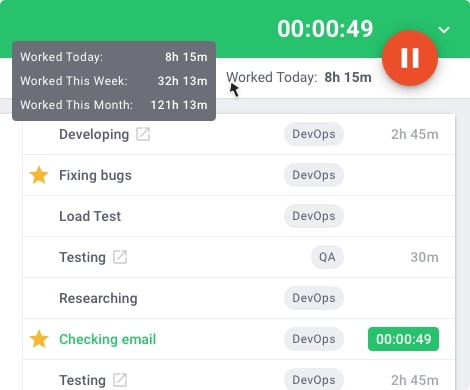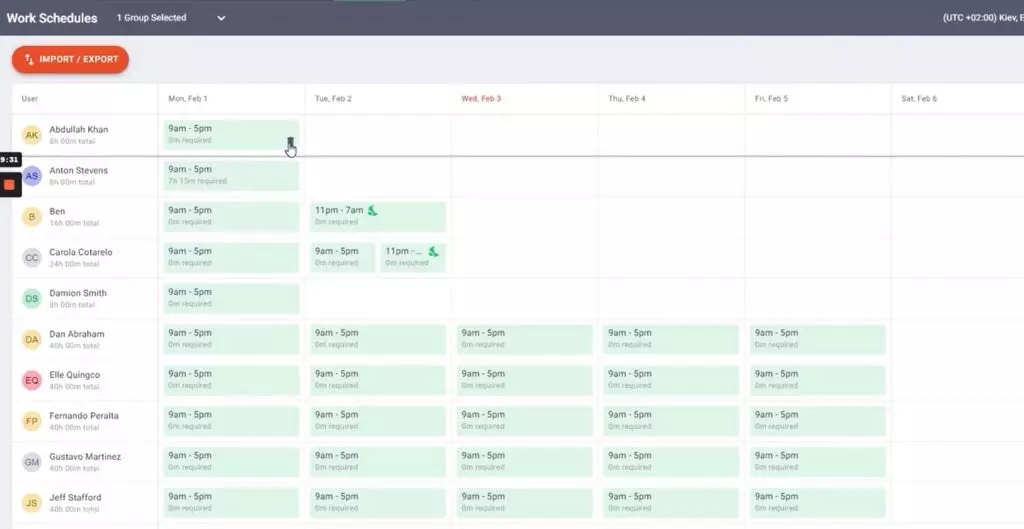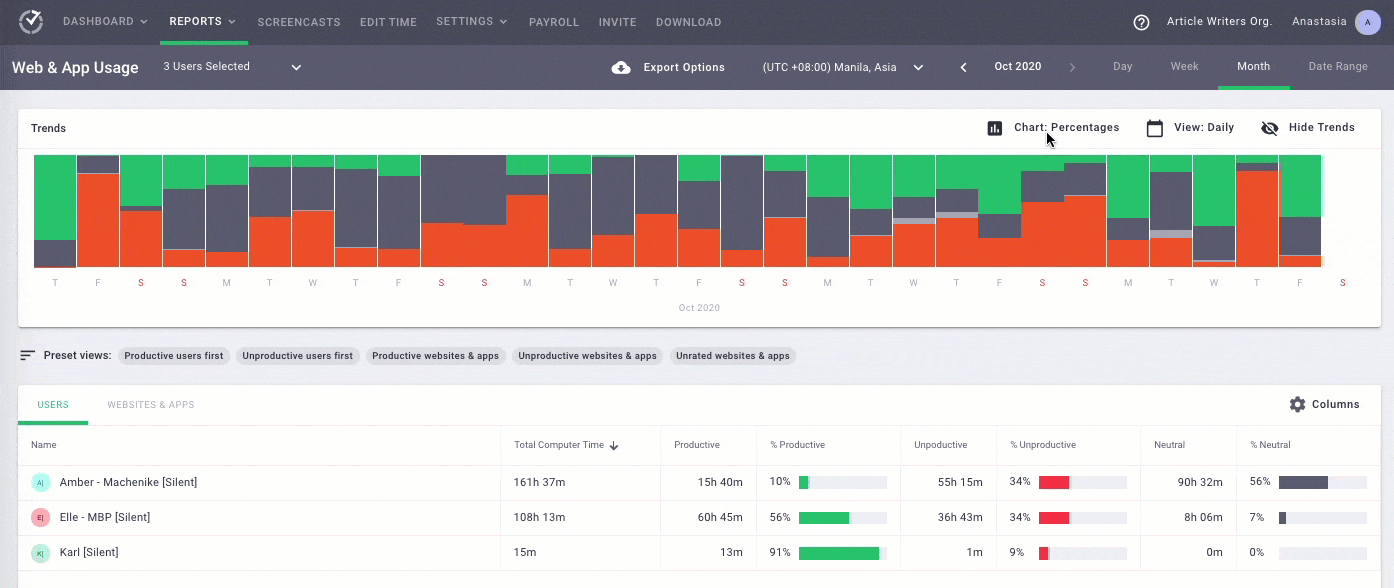Excellent time management is crucial for efficient call center operation and high agent productivity. This, in turn, helps you provide top-notch customer service.
However, managing time in a customer support center can be difficult due to unpredictable call volumes, agent burnout, and other factors.
So how do you improve time management for call center agents?
In this article, we’ll share 12 smart tips to improve time management for call center agents and three reasons why it’s important. We’ll also introduce a powerful time management software for call center agents.
This Article Includes:
(Click on the link to go to a particular section)
- 12 tips to improve time management for call center agents
- 3 reasons why time management is important for call centers
- Time Doctor: An effective time management tool for call centers agents
Let’s get started.
12 tips to improve time management for call center agents
As a call center manager, let’s look at the 12 time management best practices for the call center workforce:
1. Prioritize tasks in the to-do list
Sometimes your agent may not be able to achieve their daily targets. This could be because they’re prioritizing tasks in their to-do list incorrectly.
They may not be starting their day with the most important tasks, leading to missed deadlines. All this could make it seem like they weren’t working diligently.
That’s why it’s an excellent practice to coach your customer service agents to prioritize tasks based on their importance and urgency.
For example, you can ask your agents to take up the tickets in chronological order. This way, you can ensure that customers who approach you with issues first don’t wait long for a solution.
Similarly, you can ask agents to solve premium customers’ tickets before others. This is to ensure high satisfaction levels for loyal customers.
2. Prevent overworking
Taking on more tasks can seem like the agent is being helpful.
But in reality, they can be overworking or burning themselves out, which can lead to poor agent performance and low job satisfaction at some point.
As a result, it’s crucial that you ask agents not to overburden themselves.
You need to look out for agents who regularly take up additional responsibilities and end up working for long hours. Establish guidelines regarding when tasks can be passed on among employees and ensure such agreements happen with your knowledge.
This way, you can spot if an agent is overworking and reassign tasks to prevent it.
3. Set achievable targets
At times, your customer service agents may fail to estimate their targets correctly and end up setting unrealistic goals. This could lead to burnout, poor self-image, and low agent satisfaction.
To avoid that, you need to train agents to set SMART (Specific, Measurable, Achievable, Realistic, and Time-bound) goals. This goal-setting methodology ensures that the agent gets a clearer picture of their targets and helps them mentally prepare for work.
4. Delegate easy calls and tasks
Due to workload management issues, some agents may end up getting a disproportionate amount of work.
In such cases, you may have to delegate tasks to others. Doing so can make sure that work is divided among agents fairly and no one in the team stresses out.
However, you need to see that the agent you’re delegating to has the capacity to complete the task perfectly. You can also utilize this opportunity to train a talented, newly hired agent.
For example, besides attending incoming calls, a senior agent may also need to conduct a training session. You can redirect some phone calls to a new agent and free some space for the senior agent.
This way, you can prevent agent burnout and also ensure a high-quality customer experience.
5. Monitor how an agent spends time
Monitoring employee time can help you get insights into employee productivity.
To monitor employee time usage, you can track KPIs like:
- Average Handle Time (AHT): The average amount of time required to manage an inbound call from the beginning to the end.
- Longest Hold Time Rate: The longest time a customer was put on wait before attending the call.
- First Call Resolution (FCR): The percentage of customer issues resolved in the first call.
- Service Level: The percent of the KPI goals a call center meets during a particular time period.
In addition to these, time tracking also lets you know how long a customer service agent takes to go through the training modules, solve a customer issue, and do other non-call activities.
These metrics and data can give insights into agent productivity and aid call center performance management.
However, logging time the traditional way can be tiresome and time-consuming. Instead, you can use powerful time tracking tools like Time Doctor to record agent activities during working hours.
6. Facilitate a flexible work scheduling
According to a 2020 study, the tiring effect of commuting affects agent performance negatively. It also reported that agent satisfaction decreases with increasing commute time.
You can reduce the commute time for employees by adopting a hybrid work model. It allows agents to work from home and office.
Such flexible work systems let them manage their work and personal life without stress. As a result, these modern systems can build a relaxed work environment that can increase job satisfaction and agent productivity over the longer run.
Additionally, commuting takes up a good amount of time from the agents’ day, and by avoiding it, they can incorporate other important tasks into their schedule.
7. Develop a time and attendance policy
Creating a clear attendance and time use policy can help set the right expectations among your agents.
For example, regulate the time a customer service agent spends on customer issues coming in via social media by specifying a time limit. Similarly, you can ask them to track and control the time they spend on customer phone calls.
If not, agents may take longer than needed to solve issues.
For example, you can ask your team not to spend more than 10 minutes on a customer call. If the issue is unresolved, they can transfer the call to their center supervisor.
Additionally, your attendance policy needs to clarify log in and out times, as well as meal breaks. Such precise guidelines may show agents how to manage their work time.
Check out our guide on how to create an effective call center attendance policy!
8. Use latest call center technology
The customer service industry is growing quickly, and their technology is also improving to accommodate different demands.
Today, there are several tools that help with call center management, task automation, customer interaction optimization, and more.
Let’s look at a few of the important tools:
- Computer telephony integration: Shows customers’ caller information like phone number, previous tickets, etc., on the computer screen before attending the call. This saves the time agents would otherwise spend asking customers’ basic details.
- Automatic call distribution (ACD): Recognizes calls and routes them to appropriate agents. For a call center receiving high phone call volumes, this device can improve customer experience and save time.
- Workforce management (WFM): Lets you forecast the number of agents you may need to achieve call center service level goals. You can plan staffing and efficiently carry out center workforce management based on this tool.
- Call recording tool: Record calls and screen activity to monitor agent and customer interaction. You can also observe recorded calls to train agents to improve their communication skills and customer service.
- Chatbots: an AI (Artificial Intelligence) based software that conducts online conversations via text or text to speech.
- Customer self-service portals: a knowledge base that provides answers to Frequently Asked Questions (FAQs).
9. Focus on quality management
You can get an insight into an agent’s performance and identify their weak spots using time management.
A supervisor can follow the amount of time an agent takes to complete a task and compare it to the average time all other agents take. Then, they can carry out appropriate steps for quality management.
For example, let’s say a call center manager finds that newly hired agents take longer than others to complete ACW (After Call Work). You can control this by conducting training before onboarding.
10. Promote work-life balance
Successful call center time management is all about empowering agents to complete their tasks on time without taking any undue stress.
When agents wrap up their work at the right time, it gives them enough time to spend on personal commitments.
They can use this time to improve their health, develop new skills, spend time with family, or on other non-work activities. This may help them develop a healthy lifestyle and have a great work-life balance while increasing employee engagement.
11. Take regular breaks
Most call center tasks require agents to look at computer screens. But high screen time can be associated with poor mental and physical health. To prevent this, you should encourage them to take regular breaks.
You can suggest the 20/20/20 rule – a regulated break practice.
According to this practice, an agent needs to look at an object 20 feet away from them for 20 seconds after every 20 minutes of screen time.
In addition, you also need to incorporate snack and lunch breaks in their daily schedules. A 2018 study shows that taking breaks at regular intervals can increase productivity by instilling a refreshing feeling.
12. Prioritize high-quality work
It’s essential to train your agents to concentrate only on a single task at a time and avoid multitasking.
Although multitasking seems like a great time management practice, it can lead to errors and affect quality assurance. And they may have to work on the same task again – spending twice as much time – and decreasing customer satisfaction.
For example, a multitasking agent may record wrong information during a customer interaction. When the customer calls for a follow-up, a team member could suggest solutions based on wrong information, disrupting effective customer service.
Now that we have covered the best call center time management tips, let’s look at how they can help your call center.

3 reasons why time management is important for call centers
Implementing and following time management practices require effort.
To motivate your agents to establish time management in your organization, explain its benefits to them.
Here are a few of them:
1. Prevents burnout
If they manage their time well, your agents may not have to put in extra hours close to the deadline.
Essentially, they need to divide tasks throughout the week or month. This can decrease overall stress and induce a peaceful working environment.
Moreover, it can help reduce agent turnover by improving the work timings and ensuring high job satisfaction.
2. Develops self discipline among agents
Cultivating time management skills can develop self-discipline in the agents’ personal and professional lives.
For example, an agent who completes work on time with good time management skills may get promoted quickly.
Also, an agent with self-discipline is more likely to follow the call center scheduling correctly. They may start and end their shifts on time.
It can help smoothen call center management as all work will mostly happen in an organized manner.
3. Improves customer satisfaction
Great time management skills can ensure that agents close tickets and complete tasks on time.
Additionally, since agents are less likely to rush through tasks, they make minimal errors. This can help boost customer satisfaction.
Sure, call center agents should manage their time efficiently.
But how do you keep track of how and where they spend their work hours?
Using traditional spreadsheet-based timesheets is impractical due to their error-prone, time-consuming, and tedious nature.
Instead, you should go for a powerful and smart time-management software tool that’s perfect for your customer service agents.
Time Doctor: An effective time management tool for call centers agents

Time Doctor is a powerful time and agent productivity tracking software used by SMBs like Thrive Market and large enterprises like Ericsson.
The tool can effectively track an agent’s time on customer calls and other tasks, helping agents improve their productivity and time management skills.
Let’s take a look at some key Time Doctor features:
1. Manual and silent time tracking
The software offers a manual or interactive time tracker, which the agent can operate by clicking on the Start and Stop buttons.

It also has a silent time tracker that starts logging time automatically when the agent switches the system on. Additionally, this timer runs in the background and doesn’t disrupt the agents’ workflow.
2. Work schedules
The tool helps you set flexible or fixed schedules for each agent and note whether they start their shifts on time.
It automatically shows an agent is ‘Absent’ if they didn’t record time, ‘Partially Absent’ if they’re late, and ‘Present’ if they start their shift on time.

3. Productivity reports
Time Doctor generates detailed real-time productivity reports to help you spot productivity trends, understand the overall call center performance, and workflow optimization.
These reports include:
- Activity report: Shows an agent’s desktop and mobile app time, unproductive time, active time, etc.
- Hours tracked report: Lets you view the hours an agent tracked during a specific duration.
- Attendance report: Reveals the attendance statuses of different agents.
- Timeline report: Shows how an agent spent time on different tasks and breaks in a day.
- Project and task report: Allows you to see all the time an agent spent on each project and task.
- Web and app usage report: Shows the time an agent spends on each app and website.

4. Chrome Extension and integration
Time Doctor offers a powerful Chrome Extension that allows you to integrate with several premium tools like:
- Project management: Evernote, Zoho Projects, Asana, etc.
- CRM: Zoho, Pipedrive, etc.
- Help Desk: Zendesk, Freshdesk, etc.
With this feature, your agents need not juggle Time Doctor with other call center tools while working.
Explore more handy Time Doctor features from here.
Wrapping up
Agent time management is important to prevent burnout, nourish self-discipline, and increase customer satisfaction.
Use the tips shared in this article to improve agent productivity, task prioritization, schedule adherence, etc.
Most importantly, you need to get the latest call center management tools, including a time tracking software like Time Doctor for real-time management.
With Time Doctor, you can track agent productivity, analyze their time usage patterns, and do so much more to improve call center efficiency.
Sign-up for Time Doctor’s 14 days free trial and improve time management for your agents.

Andy is a technology & marketing leader who has delivered award-winning and world-first experiences.


